#Nesuhi Ertegun
Explore tagged Tumblr posts
Text
"The Wonderful World of Jazz:" Exploring John Lewis' 1961 Masterpiece
Introduction: John Lewis, best known for his work with the Modern Jazz Quartet (MJQ), carved out a significant niche for himself in the jazz world with his sophisticated compositions and distinctive piano style. One of his most rewarding endeavors outside the MJQ is the album “The Wonderful World of Jazz,” released in 1961. This album not only showcases Lewis’ prowess as a pianist and composer…
#Arif Mardin#Benny Golson#Classic Albums#Connie Kay#Eric Dolphy#George Duvivier#Gunther Schuller#Herb Pomeroy#James Rivers#Jazz History#Jim Hall#John Lewis#Marilyn Crispell#Modern Jazz Quartet#Nat King Cole#Nesuhi Ertegun#Paul Gonsalves#The Wonderful World of Jazz#Tom Dowd#Tommy Flanagan
3 notes
·
View notes
Text
How John Coltrane’s ‘My Favorite Things’ Changed American Music:
"… composed by the grandsons of German and Russian Jews, about an Austrian family fleeing the Nazis on their way to America, played by an African American genius in a vernacular American style, produced by one Turkish American for a record label owned by another Turkish American. The recording is not in or of the melting pot. It is the melting pot."
2 notes
·
View notes
Text
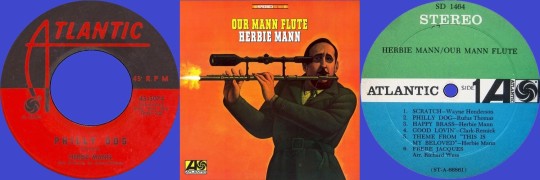
Herbie Mann - Philly Dog (1966) Rufus Thomas from: "Philly Dog" / "Frere Jacques" (Single) "Our Mann Flute" (LP)
Jazz | Instrumental | Soul Jazz Mar-Keys Cover
JukeHostUK (left click = play) (320kbps)
Personnel: Herbie Mann: Flute
King Curtis: Saxophone, Tenor and Baritone Pepper Adams: Baritone Saxophone Quentin Jackson: Trombone and Bass Trombone
Trumpet: Marky Markowitz Joe Newman
Jimmy Wisner: Piano
Guitar: Al Gorgoni Charles Macey
Warren Smith: Percussion Joe Mack: Electric Bass Bernard Purdie: Drums
Arranged by Conducted by: Jimmy Wisner Produced by Nesuhi Ertegun
Recorded: @ The Atlantic Records Studios in New York City, New York USA on May 26, 1966
Released: 1966
Atlantic Records
#Herbie Mann#Jazz#1966#King Curtis#Our Mann Flute#Atlantic Records#Nesuhi Ertegun#Rufus Thomas#Mar-Keys#Philly Dog
5 notes
·
View notes
Text
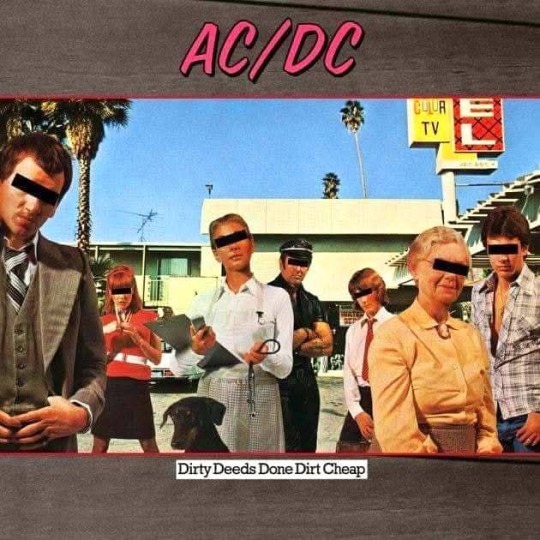
AC/DC - Dirty Deeds Done Diet Cheap 17/12/1976
A brief history background on the AC/DC record that was released in no less than three different editions/pressings:
A modified international edition was released on Atlantic on 17th December 1976, although the label was unhappy with its vocals and production. (According to bassist Mark Evans, band manager Michael Browning told him he assumed Bon Scott would be fired as a result.) The band even teetered on the brink of being dropped. "The Atlantic A&R department [in the US] said, 'We're sorry, but this album actually doesn't make it,'" recalled Phil Carson, who had signed the band. "'We're not gonna put it out and we're dropping the band'… So I went to [Atlantic executive] Nesuhi (Ertegun) and showed him the sales figures that we'd got for High Voltage. They were not awe-inspiring but, considering we'd only paid $25,000 for the album, this was not so bad… Nesuhi backed me up and I re-signed the band at that point. I managed to claw it back in. Thank God."
As biographer Murray Engleheart observes in his book AC/DC: Maximum Rock & Roll, the band had not even toured the States yet, a market the band longed to conquer:
The tough rock acts only got what little airwave attention they did because they'd built up a fanbase through years on the road. AC/DC hadn't had the opportunity to marshal troops through touring the U.S., and at the time there was no way something as raw and gritty as Dirty Deeds was going to make it onto American radio playlists by itself. It was a brutally simple catch-22...Americans were said to have trouble understanding Bon, and if the people working with the band couldn't make out the lyrics, how was his voice going to work on the all-important U.S. radio networks?
Following the American success of Highway to Hell in late 1979, copies of the album began to appear as imports in the US. Some of these were the original Australian edition on Albert Productions; however, Atlantic also pressed the international version in Australia, and many of these were also exported to the US. Strong demand for both versions (in the wake of the even greater success of Back in Black) led the US division of Atlantic to finally authorize an official US release in March 1981. It went straight to No. 3 on the Billboard album charts.
However, the release was also poorly timed, considering that AC/DC had successfully reinvented itself with a new singer, Brian Johnson. The band was working on a new album, which would ultimately become For Those About to Rock We Salute You, released later that same year; the US release of Dirty Deeds was widely seen as damaging the momentum for that album, which it outsold. The band was forced to add songs from Dirty Deeds to its setlist on its subsequent tour, also taking the focus away from their new album.
In the book The Youngs: The Brothers Who Built AC/DC, author Jesse Fink quotes Phil Carson as saying that the release of Dirty Deeds was "one of the most crass decisions ever made by a record-company executive", blaming A&R man Doug Morris and his New York cohorts:
At the time, Doug's argument was purely financial. Back in Black had already sold over five million copies. Because of those numbers, Doug told me Dirty Deeds would sell at least 2 million. I told him he was right about that, but that it would also create a new sales plateau for AC/DC...God knows how many albums For Those About to Rock would have sold had Doug waited for that to come out.
The international release had significant variations from the original album. "Jailbreak" (which had preceded the LP's release in Australia and the UK) and "R.I.P. (Rock in Peace)" were jettisoned in favor of "Rocker" (from the 1975 Australian album T.N.T.) and "Love at First Feel". "Jailbreak" did not see a release in the United States, Canada, and Japan until October 1984 as part of the international '74 Jailbreak EP. A promo-only single, with "Show Business" as its B-side, was released to radio stations in the US at the time. "Love at First Feel" is one of only two tracks from international AC/DC albums not to be available on the band's Australian albums (the other is "Cold Hearted Man", released on European pressings of Powerage); however, "Love at First Feel" was released in Australia as a single in January 1977, with "Problem Child" as its B-side, which peaked in the Kent Music Report Singles Chart Top 100.
The international release of Dirty Deeds also contains "Big Balls", one of the band's most infamous compositions, that finds Scott, a deceptively clever lyricist, using double entendres by using ballroom and costume parties to obviously reference his own testicles. AC/DC had mined this territory before on "The Jack" and would again later on songs like "Given the Dog a Bone", but "Big Balls" could be their funniest attempt at sexual innuendo, although the song was controversial in its day and drew the ire of some critics who mistook the band's sense of humor for crude perversity. Dirty Deeds Done Dirt Cheap also led to more AC/DC appearances on Australia's Countdown music programme, following those in support of High Voltage and T.N.T. These appearances included a live performance of the album's title track, as well as a music video for "Jailbreak".
Two songs on the international album were edited from the full-length versions on the original Australian album. The full-length "Dirty Deeds Done Dirt Cheap" has the title of the song chanted four times, starting at 3:09, but on the edited version the chant is heard only twice. "Ain't No Fun (Waiting Round to Be a Millionaire)" lasted 7:29 on the Australian album but was faded out early to 6:57 on the international version.
This means they trim off the Chuck Berry licks and title chanting to the end; however, both these full-length versions were restored on the 1994 Atco Records remastered CD of the international album. The most recent 2003 CD edition by Epic Records goes back to the edited versions, as originally on the 1976 and 1981 international vinyl editions.
The uncut versions of both songs were released on the 2009 box set Backtracks. On the original version of "Rocker", included on the Australian T.N.T. album, the song lasts 2:55 and cuts out abruptly as the guitar riff hits its peak. Conversely, all international editions of the "Dirty Deeds Done Dirt Cheap" album have a slightly shorter version where the song fades out at 2:50 before the cut. "Squealer" appears to be longer by thirteen seconds on the international version; this is due to it having a bumper of silence at the end, as it is the final track on the record.
"Ride On" has a four-second difference (longer on the international version) which appears to be from a minor speed issue, although the last guitar slide can be heard better on the shorter Australian version.
#metalcultbrigade#artists on tumblr#art#hard rock#rock#classic rock#blues rock#ac/dc#ac dc#70's music#70's#70's rock
5 notes
·
View notes
Text
Ilhan Mimaroglu and Agitprop (Political Classical Again)
İlhan Kemaleddin Mimaroğlu (1926-2012) photo credit unknown, fair use Portrait of Ahmet M. Ertegun and Nesuhi Ertegun, Turkish Embassy (record room), Washington, D.C., 193- (Photo credit: Wikipedia) It would be difficult to underestimate the impact of Turkish immigrant brothers Ahmet and Nesuhi Ertegun on the American music industry in the last half of the 20th century with their promotion and…

View On WordPress
#20th century#Ahmet Ertegun#Anthony Braxton#Arif Mardin#Art Booth#Atlantic Records#avant garde#Charles Grau#classical#Composers#contemporary music#Daniel Paget#electroacoustic#Electronic Music#electronics#experimental music#Fazil Husnu Daglarca#Freddie Hubbard#Frederic Rzewski#Free Jazz#Gene Orlo#Gungor Bozkurt#Jazz#Junior Cook#Kenny Barron#Louis Hayes#Mary Ann Hoxworth#Modern Music#Music#My Lai
0 notes
Video
youtube
SWISS MOVEMENT - Compared to What (Live at Montreux Jazz Festival)
Trumpet: Benny Bailey Drums: Donald Dean Tenor Saxophone: Eddie Harris Producer: Joel Dorn Bass Guitar: Leroy Vinnegar Piano, Vocals: Les Mccann Producer: Nesuhi Ertegun Writer: Gene McDaniels
1 note
·
View note
Audio

Bobby Darin - Beyond the Sea (Stereo) (1959) Bobby Darin with The Richard Wess’ Orchestra Music: Charles Trenet / English Lyrics: Jack Lawrence from: "That's All" (LP) "Beyond the Sea" / "That's the Way Love Is" (Single)
Traditional Pop | Big Band
JukeHostUK (left click = play) (320kbps)
Personnel: Bobby Darin: Vocals
Moe Wechsler: Piano Mundell Lowe: Guitar
Trumpets: Joe Cabot Mel Davis Al DeRisi Doc Severinsen
Trombones: Billy Byers Cutty Cutshall Frank Rehak Chauncey Welsch
Reeds: Leon Cohen Walt Levinsky Seldon Powell Jerry Sanfino
Strings: Unidentified
Eddie Safranski: Bass Don Lamond: Drums
Richard Wess: Arranger / Conductor Produced by Ahmet Ertegun / Nesuhi Ertegun / Jerry Wexler
Recorded: @ The Atlantic Studios in New York City, New York USA on December 24, 1958
Released: in October of 1959
ATCO Records Atlantic Records
Bobby Darin: Beyond The Sea
48 notes
·
View notes
Audio
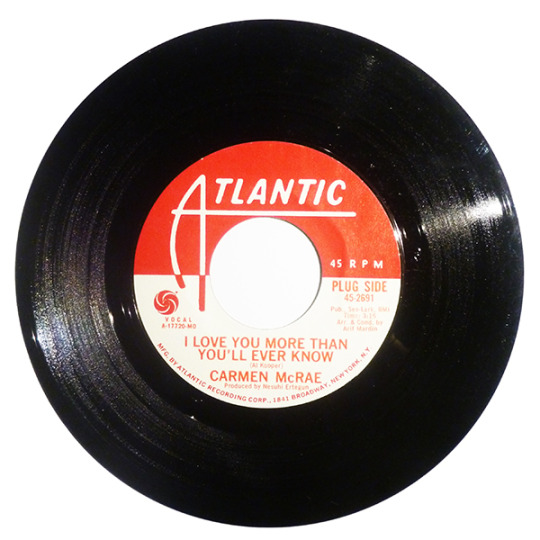
Carmen McRae - I Love You More Than You'll Ever Know (Atlantic)
wrt. Al Kooper, arr. Arif Mardin & prod. Nesuhi Ertegun.
#Carmen McRae#I Love You More Than You'll Ever Know#female jazz#jazz vocal#jazz#soul#al kooper#arif mardin#nesuhi ertegun
19 notes
·
View notes
Video
youtube
But not for me (Ginger Rogers cover) by John Coltrane from the album My Favorite Things
#music#jazz#john coltrane#ira gershwin#george gershwin#israel gershowitz#jacob bruskin gershowitz#john william coltrane#mccoy tyner#nesuhi ertegun#steve davis#elvin jones#elvin ray jones#nesuhi ertegün#alfred mccoy tyner
15 notes
·
View notes
Text
"Beauty Is a Rare Thing": Ornette Coleman's Sonic Odyssey Through Avant-Garde Jazz
Introduction: On November 16, 1993, Rhino Records unveiled a musical treasure trove that transcended the boundaries of jazz. “Beauty Is a Rare Thing: The Complete Atlantic Recordings” by Ornette Coleman, a pioneering saxophonist and composer, stands as a testament to the avant-garde movement that swept through the jazz landscape in the late 1950s and early 1960s. This box set, meticulously…
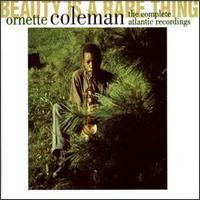
View On WordPress
#Beauty Is a Rare Thing#Billy Higgins#Charlie Haden#Classic Albums#Don Cherry#Ed Blackwell#Eric Dolphy#Freddie Hubbard#Free Jazz#Jazz History#John Lewis#Modern Jazz Quartet#Nesuhi Ertegun#Ornette Coleman#Ornette on Tenor#Scott LaFaro#The Art of the Improvisers#The Shape of Jazz to Come#To Whom Who Keeps A Record#Twins#Yves Beauvais
3 notes
·
View notes
Photo
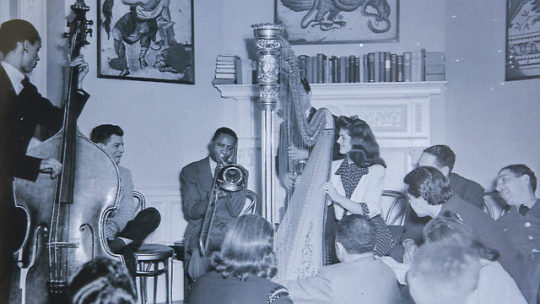
"A Social Revolution:" How the Turkish Embassy Desegregated Jazz in Washington DC
I worked for Nesuhi and Ahmet Ertegun in the early ‘70s. They were highly educated sons of a Turkish ambassador, who led a privileged life style in Paris and then in Washington, D.C. They loved jazz and blues and the African-Americans who made it. They broke segregation barriers at events that celebrated their love of jazz. They soon became major forces in the recording field with Atlantic Records, and became champions of Black American culture. They lived as well-to-do citizens of the world, but their roots in American music was their life’s mission.
-Michael Cuscuna
Listen… Follow: Mosaic Records Facebook Tumblr Twitter
#Nesuhi Ertegun#Ahmet Ertegun#Turkish Embassy#Washington DC#Duke Ellington#Jelly Roll Morton#classic jazz#Michael Cuscuna
16 notes
·
View notes
Audio

Herbie Mann - The Wailing Dervishes (Stereo) (1967) Herbie Mann from: "The Wailing Dervishes" (LP)
Jazz | Ethno Jazz | World Music
JukeHostUK (left click = play) (320kbps)
Personnel: Herbie Mann: Flute Roy Ayers: Vibraphone [Vibraharp] Chick Ganimian: Oud Reggie Workman: Bass Moulay “Ali” Hafid: Goblet Drum [Dümbek] Bruno Carr: Drums
Produced by Nesuhi Ertegun
Recorded Live: @ The Village Theater in New York City, New York, USA on June 3, 1967
Released: in March of 1968
Atlantic Records

"Herbie Mann, was an American jazz flute player and important early practitioner of world music." - Wikipedia Herbie Mann: https://en.wikipedia.org/wiki/Herbie_Mann
#Jazz#Herbie Mann#World Music#The Wailing Dervishes#Flute#Atlantic Records#Nesuhi Ertegun#Ethno Jazz#1960's#Flutist#Flautist
4 notes
·
View notes
Video
youtube
Bubblegum of the Highest Order..on Bang records “Bang Records was created by Bert Berns in 1965 together with his partners from Atlantic Records: Ahmet Ertegun, Nesuhi Ertegun and Jerry Wexler. The first letters of their names (Bert, Ahmet, Nesuhi, Gerald) formed the label's name.. Berns had been staff producer at Atlantic Records for several years when he and Atlantic chief executives set out to create a new independent label. In 1966, Berns took sole control of the company. At Bang he had an immediate string of hit records, including "I Want Candy" by the Strangeloves, "Hang On Sloopy" by the McCoys, "Brown Eyed Girl" by Van Morrison and "Solitary Man" and "Kentucky Woman" by Neil Diamond..”
1 note
·
View note
Photo

Today we remember the passing of Jerry Wexler who Died: August 15, 2008 in Sarasota, Florida
Gerald "Jerry" Wexler (January 10, 1917 – August 15, 2008) was a music journalist turned music producer, and was one of the main record industry players behind music from the 1950s through the 1980s. He coined the term "rhythm and blues", and was integral in signing and/or producing many of the biggest acts of the time, including Ray Charles, the Allman Brothers, Chris Connor, Aretha Franklin, Led Zeppelin, Wilson Pickett, Dire Straits, Dusty Springfield and Bob Dylan. Wexler was inducted to the Rock and Roll Hall of Fame in 1987 and in 2017 to the National Rhythm & Blues Hall of Fame.
Wexler was born in The Bronx, New York City, the son of a German Jewish father and a Polish Jewish mother; he grew up in the Washington Heights neighborhood of Upper Manhattan. Despite graduating from George Washington High School at age 15, he dropped out of the City College of New York after two semesters. In 1935, Wexler enrolled at what is now Kansas State University, where he studied intermittently for several years. Following his service in the Army, Wexler became a serious student, and he graduated from Kansas State with a B.A. in journalism in 1946.
During his time as an editor, reporter, and writer for Billboard Magazine, Wexler coined the term "rhythm and blues". In June 1949, at his suggestion, the magazine changed the name of the Race Records chart to Rhythm & Blues Records. Wexler wrote, "'Race' was a common term then, a self-referral used by blacks...On the other hand, 'Race Records' didn't sit well...I came up with a handle I thought suited the music well – 'rhythm and blues.'... It was a label more appropriate to more enlightened times."
Wexler became a partner in Atlantic Records in 1953. There followed classic recordings with Ray Charles, the Drifters and Ruth Brown. With Ahmet and Nesuhi Ertegun, he built Atlantic Records into a major force in the recording industry.
In the 1960s, he recorded Wilson Pickett and Aretha Franklin, and oversaw production of Dusty Springfield's highly acclaimed Dusty in Memphis and Lulu's New Routes albums. He also cultivated a tight relationship with Stax Records, was an enthusiastic proponent of the then-developing Muscle Shoals Sound and launched the fortunes of Muscle Shoals Sound Studios and the Muscle Shoals Rhythm Section. In 1967 he was named Record Executive of the Year for turning Aretha Franklin's career around. In November 1966, Franklin's Columbia recording contract expired; at that time, she owed the company money because record sales had not met expectations. Working with Wexler and Atlantic, Franklin was "the most successful singer in the nation" by 1968. His work in this decade put Atlantic at the forefront of soul music.
In 1968, he and Ahmet Ertegun signed Led Zeppelin to Atlantic Records on the recommendation of singer Dusty Springfield and from what they knew of the band's guitarist, Jimmy Page, from his performances with the Yardbirds. With its strong catalog, Atlantic Records was purchased by Warner Bros. Records in 1968. In 1975, Wexler moved from Atlantic to its parent Warner Records.
In 1979, Wexler produced Bob Dylan's controversial first "born again" album, Slow Train Coming at Muscle Shoals; a single from that album, "Gotta Serve Somebody", won a Grammy Award in 1980. When Wexler agreed to produce, he was unaware of the nature of the material that awaited him. "Naturally, I wanted to do the album in Muscle Shoals - as Bob did - but we decided to prep it in L.A., where Bob lived", recalled Wexler. "That's when I learned what the songs were about: born-again Christians in the old corral... I like the irony of Bob coming to me, the Wandering Jew, to get the Jesus feel... But I had no idea he was on this born-again Christian trip until he started to evangelize me. I said, 'Bob, you're dealing with a sixty-two-year-old confirmed Jewish atheist. I'm hopeless. Let's just make an album.'"
In 1983, Wexler recorded with UK pop star George Michael. The most famous out-take of these sessions would prove to be a rare early version of "Careless Whisper", recorded in Muscle Shoals.
In 1987, Wexler was inducted into the Rock and Roll Hall of Fame. He retired from the music business in the late 1990s.
For most of the 1990s, Wexler lived on David's Lane in East Hampton, New York, where he shared living space with a Chinese family who aided him with daily functions and kept him company.
He died at his home in Sarasota, Florida, on August 15, 2008, from congestive heart failure. Asked by a documentary filmmaker several years before his death what he wanted on his tombstone, Wexler replied "Two words: 'More bass'."
7 notes
·
View notes
Text
1 note
·
View note
Text
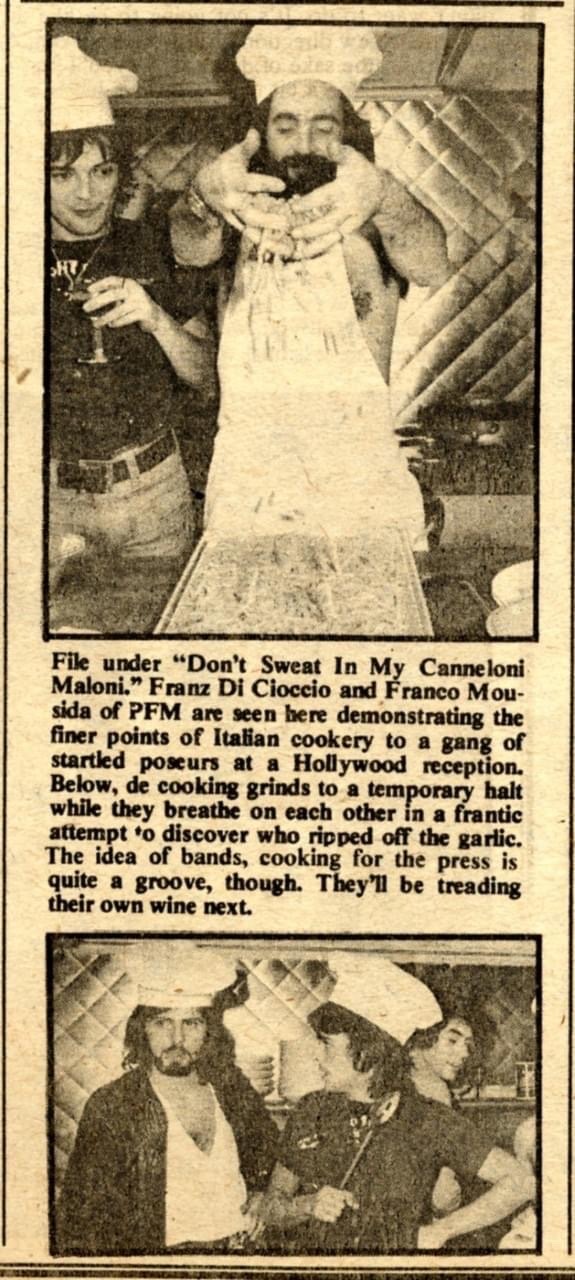
“A lot of the bands would be taking drugs, but our big thing was food,” Djivas says. “The bands we were playing with would often stay at the same hotel, and would come over to our room, attracted by this great smell. We’d be cooking spaghetti, we’d have a little wine and all start singing. Aerosmith used to come to our room every night for spaghetti. Steven Tyler would be singing and laughing all the time. We used to do little theatre pieces in our room, where we did imitations of Elvis Presley and Sha Na Na, and they were having so much fun.
“The two brothers at Atlantic Records, Ahmet and Nesuhi [Ertegun], were big enemies at the time and hadn’t talked to each other in years.
But they got together one night on our floor, eating spaghetti with plastic forks and having a good time. And all the other people at Atlantic were freaking out. We had so many times like that. Girls would be going past our room: ‘Hello, is there a party over here?’”
PFM captured their blazing live shows of ’74 on Cook, released later that year. Recorded in Toronto and New York, and topped off with the 15-minute free jam Alta Loma 5 ’Till 9, it was titled Live In U.S.A. for the European market. The press junket for Cook, fittingly, was held at a top restaurant, where 200 invited guests were served risotto and pasta – made by Mussida and Di Cioccio – in the colours of the Italian flag.
(from Classic Rock magazine, May 2018)
#this is the most amazing story#pfm#premiata forneria marconi#mauro pagani#franz di cioccio#patrick djivas#franco mussida
14 notes
·
View notes